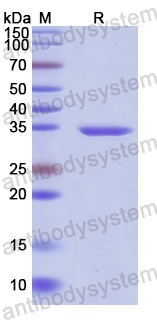Catalog No.
YHJ81001
Expression system
E. coli
Species
Homo sapiens (Human)
Protein length
Met1-Pro300
Predicted molecular weight
34.87 kDa
Nature
Recombinant
Endotoxin level
Please contact with the lab for this information.
Purity
>90% as determined by SDS-PAGE.
Accession
Q9UM07
Applications
ELISA, Immunogen, SDS-PAGE, WB, Bioactivity testing in progress
Form
Lyophilized
Storage buffer
Lyophilized from a solution in PBS pH 7.4, 0.02% NLS, 1mM EDTA, 4% Trehalose, 1% Mannitol.
Reconstitution
Reconstitute in sterile water for a stock solution. A copy of datasheet will be provided with the products, please refer to it for details.
Shipping
In general, proteins are provided as lyophilized powder/frozen liquid. They are shipped out with dry ice/blue ice unless customers require otherwise.
Stability and Storage
Use a manual defrost freezer and avoid repeated freeze thaw cycles. Store at 2 to 8°C for frequent use. Store at -20 to -80°C for twelve months from the date of receipt.
Alternative Names
PADI4, Peptidylarginine deiminase IV, HL-60 PAD, PADI5, Protein-arginine deiminase type-4, Protein-arginine deiminase type IV, PDI5, PAD4
IL-6R Signaling Is Associated with PAD4 and Neutrophil Extracellular Trap Formation in Patients with STEMI., PMID:40508157
Triple positivity for autoantibodies in patients with rheumatoid arthritis is associated with a severe course of the disease but not with bone turnover markers., PMID:40485950
Neutrophil Extracellular Traps Promote AIM2-Dependent Microglial Pyroptosis Following Stroke., PMID:40479571
Inhibiting peptidylarginine deiminases (PAD1-4) by targeting a Ca2+ dependent allosteric binding site., PMID:40379660
Inhibition of Neutrophil Extracellular Traps: A Potential Therapeutic Strategy for Hemorrhagic Stroke., PMID:40302254
Loss of peptidylarginine deiminase 4 mitigates maladaptive cardiac remodeling after myocardial infarction through inhibition of inflammatory and profibrotic pathways., PMID:40252995
Resveratrol decreases extracellular traps (ETs) in acute promyelocytic leukemia (NB4) cells., PMID:40245018
Expression of NET markers in experimental apical periodontitis induced in mice., PMID:40209315
Neutrophil extracellular traps induce trophoblasts pyroptosis via enhancing NLRP3 lactylation in SLE pregnancies., PMID:40179478
A patent review of peptidylarginine deiminase 4 (PAD4) inhibitors (2014-present)., PMID:40136037
Baicalin mitigates hyperglycemia-linked intestinal epithelial barrier impairment in part by inhibiting the formation of neutrophil extracellular traps., PMID:40098957
PAD4 Inhibitor-Loaded Magnetic Fe3O4 Nanoparticles for Magnetic Targeted Chemotherapy and Magnetic Resonance Imaging of Lung Cancer., PMID:40093545
PADI4 facilitates stem-like properties and cisplatin resistance through upregulating PRMT2/IDs family in oesophageal squamous cell carcinoma., PMID:40078091
Genetic Variants Associated with Suspected Neonatal Hypoxic Ischaemic Encephalopathy: A Study in a South African Context., PMID:40076698
Ferrostatin-1 reduces the inflammatory response of rheumatoid arthritis by decreasing the antigen presenting function of fibroblast-like synoviocytes., PMID:40050869
Neutrophils Display Novel Partners of Cytosolic Proliferating Cell Nuclear Antigen Involved in Interferon Response in COVID-19 Patients., PMID:40015257
Jinkui Shenqi decoction targets PAD4 to restrain NETosis and ameliorates psoriasis progression., PMID:40010032
Neutrophil extracellular traps license macrophage production of chemokines to facilitate CD8+ T cell infiltration in obstruction-induced renal fibrosis., PMID:39998389
Blocking peptidyl arginine deiminase 4 confers neuroprotective effect in the post-ischemic brain through both NETosis-dependent and -independent mechanisms., PMID:39966968
An Integrated Network Pharmacology and RNA-seq Approach for Exploring the Protective Effect of Isoquercitrin in Doxorubicin-Induced Cardiotoxicity: Identification of Novel Genes., PMID:39964600
Padi4-Dependent NETosis Enables Diet-Induced Gut Hyperpermeability, Translating Dysbiosis Into Systemic Inflammation and Dysmetabolism., PMID:39945856
Circulating levels of PADs and citrullinated histone H3 in SARS-CoV-2 infection: Influence of genetic polymorphisms., PMID:39904454
5-HT orchestrates histone serotonylation and citrullination to drive neutrophil extracellular traps and liver metastasis., PMID:39903533
The methyl-CpG binding domain 2 regulates peptidylarginine deiminase 4 expression and promotes neutrophil extracellular trap formation via the Janus kinase 2 signaling pathway in experimental severe asthma., PMID:39865866
Citrullination at the N-terminal region of MDM2 by the PADI4 enzyme., PMID:39840810
C5a/C5aR regulates Th1/Th2 imbalance in sepsis-associated lung injury by promoting neutrophil activation to increase PAD4 expression., PMID:39831526
NFE2-driven neutrophil polarization promotes pancreatic cancer liver metastasis progression., PMID:39827463
The role of Anti-PAD4, Anti-CarP, and Anti-RA33 antibodies combined with RF and ACPA in predicting abatacept response in rheumatoid arthritis., PMID:39815378
Glycyrrhizic acid reduces neutrophil extracellular trap formation to ameliorate colitis-associated colorectal cancer by inhibiting peptidylarginine deiminase 4., PMID:39788166
Sepsis-induced NET formation requires MYD88 but is independent of GSDMD and PAD4., PMID:39777764
Inhibition of peptidyl arginine deiminase-4 ameliorated pulmonary fibrosis via modulating M1/M2 polarisation of macrophages., PMID:39755270
[GSK484, a PAD4 inhibitor, improves endothelial dysfunction in mice with sepsis-induced lung injury by inhibiting H3Cit expression]., PMID:39725629
Down-regulation of SHP2 promotes neutrophil autophagy and inhibits neutrophil extracellular trap formation to alleviate asthma through the ERK5 pathway., PMID:39720267
Discovering covalent cyclic peptide inhibitors of peptidyl arginine deiminase 4 (PADI4) using mRNA-display with a genetically encoded electrophilic warhead., PMID:39702664
Cell Type-Preferential Expression of Peptidylarginine Deiminase 4 and p53-Dependent Therapeutic Vulnerabilities in Gastric Cancer., PMID:39661279
Citrullination of tissue factor pathway inhibitor alpha by peptidylarginine deiminase 4 impairs its natural anticoagulant activity toward factors Xa and VIIa/tissue factor and reduces binding to its cofactor protein S., PMID:39613106
Lenvatinib-activated NDUFA4L2/IL33/PADI4 pathway induces neutrophil extracellular traps that inhibit cuproptosis in hepatocellular carcinoma., PMID:39585643
Inhibition of PAD4-mediated neutrophil extracellular traps formation attenuates hypoxic-ischemic brain injury in neonatal mice., PMID:39566838
Ferroptosis Induces gut microbiota and metabolic dysbiosis in Collagen-Induced arthritis mice via PAD4 enzyme., PMID:39561902
Sorafenib-induced macrophage extracellular traps via ARHGDIG/IL4/PADI4 axis confer drug resistance through inhibiting ferroptosis in hepatocellular carcinoma., PMID:39529192
A cyclic peptide toolkit reveals mechanistic principles of peptidylarginine deiminase IV regulation., PMID:39528459
Association of PADI4 Gene Polymorphisms With Susceptibility to Rheumatoid Arthritis: Evidence From 24 Case-Control Studies., PMID:39520235
The vacuolar anti-Pseudomonal activity of neutrophil primary granule peptidyl-arginine deiminase enzymes., PMID:39493757
Increased neutrophil extracellular traps caused by diet-induced obesity delay fracture healing., PMID:39446097
Citrullination Accompanies the Development of Carotid Atherosclerotic Plaques., PMID:39421992
Loss of PADI2 and PADI4 ameliorates sepsis-induced acute lung injury by suppressing NLRP3+ macrophages., PMID:39405117
Neutrophil extracellular traps induce barrier dysfunction in DSS-induced ulcerative colitis via the cGAS-STING pathway., PMID:39388893
PAD4 Inhibitor-Loaded Layered Double Hydroxide Nanosheets as a Multifunctional Nanoplatform for Photodynamic Therapy-Mediated Tumor Metastasis Treatment., PMID:39358959
Genetics, epigenetics and autoimmunity constitute a Bermuda triangle for the pathogenesis of rheumatoid arthritis., PMID:39341491
GWAS shows the genetics behind cell-free DNA and highlights the importance of p.Arg206Cys in DNASE1L3 for non-invasive testing., PMID:39331505

